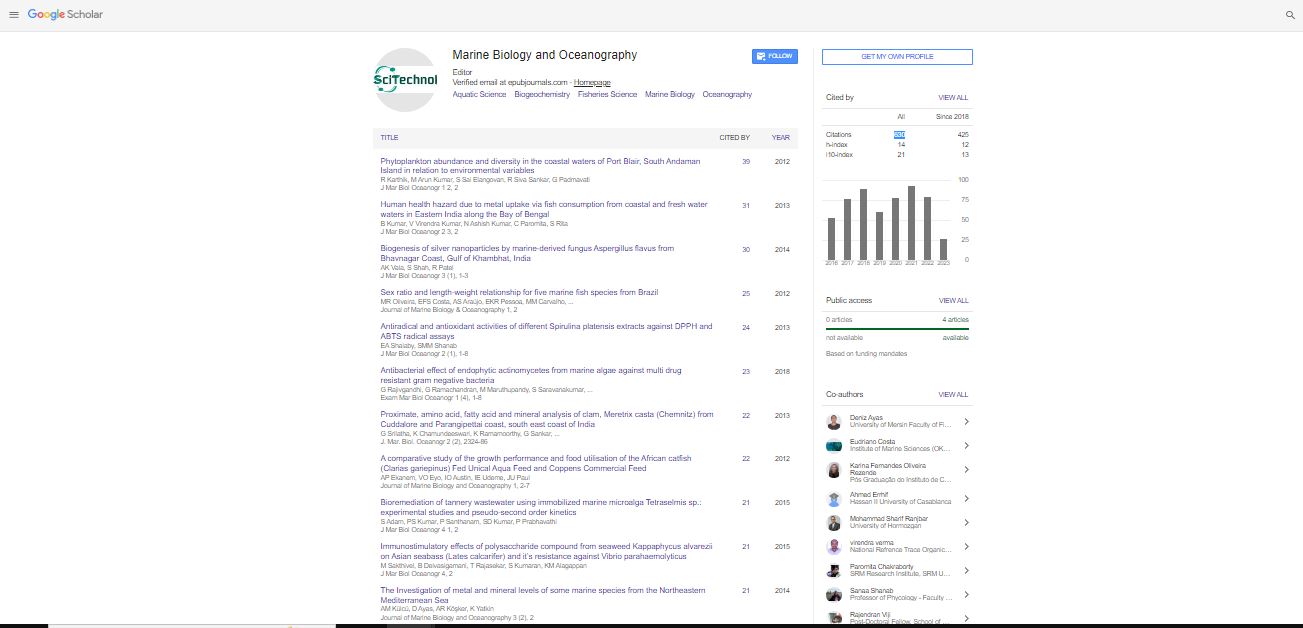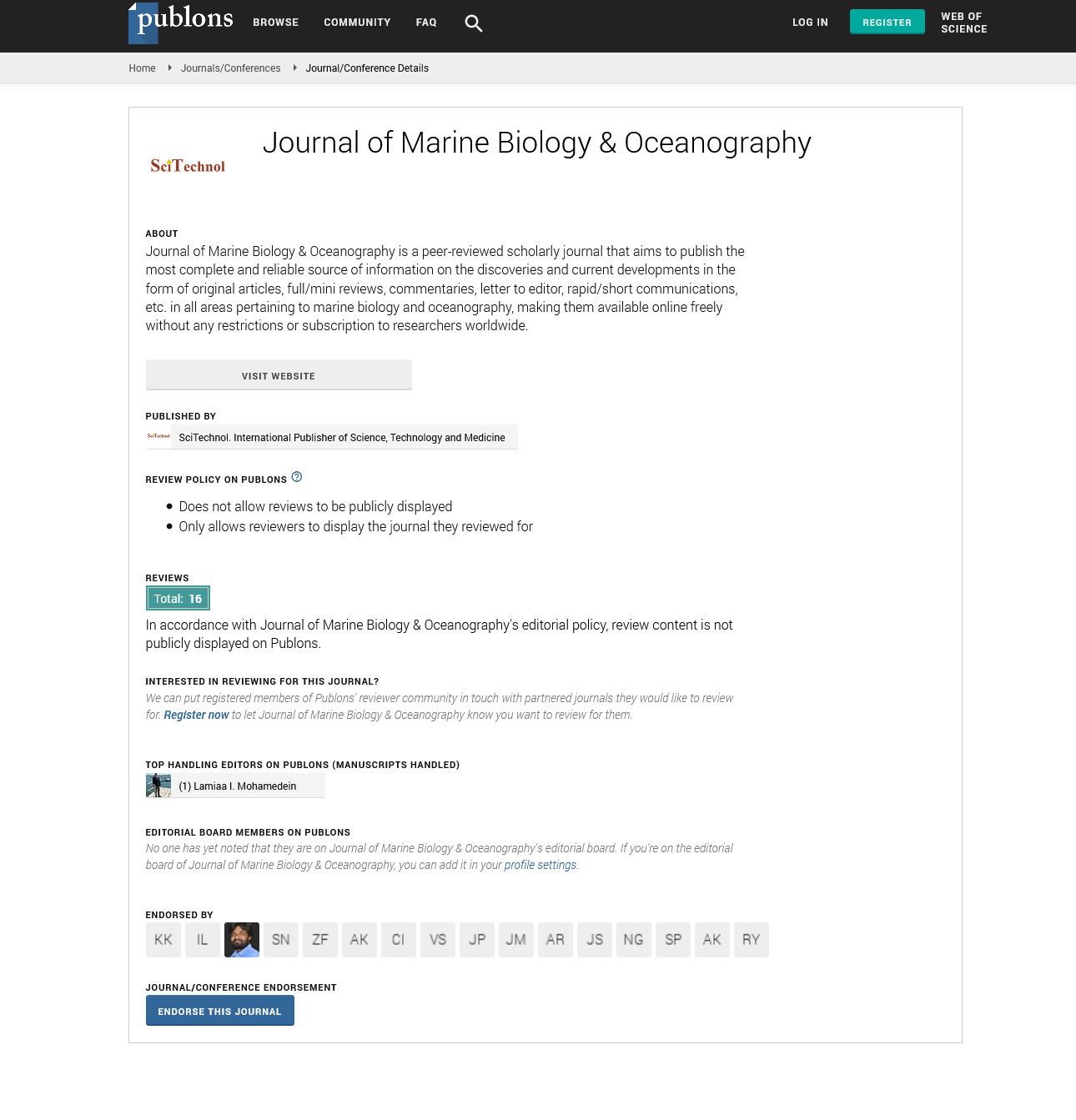Opinion Article, J Mar Biol Oceanogr Vol: 12 Issue: 1
Fisheries Science for a Sustainable Future: Conservation, Ecology, and Policy
William Frank*
Department of Fisheries and wildlife, Oregon State University, Corvallis, United States of America
*Corresponding Author: William Frank
Department of Fisheries and wildlife, Oregon State University, Corvallis, United States of America;
E-mail: williamfrank@osu11.edu
Received date: 14 February, 2023, Manuscript No. JMBO-23-95241;
Editor assigned date: 16 February, 2023, PreQC No. JMBO-23-95241 (PQ);
Reviewed date: 03 March, 2023, QC No. JMBO-23-95241;
Revised date: 10 March, 2023, Manuscript No. JMBO-23-95241 (R);
Published date: 20 March, 2023, DOI: 10.4172/2324-8661.1000255.
Citation: Frank W (2023) Fisheries Science for a Sustainable Future: Conservation, Ecology, and Policy. J Mar Biol Oceanogr 12:1.
Description
Fisheries are a major component of global food security, providing livelihoods, nutrition, and economic opportunities to millions of people around the world. However, overfishing, habitat degradation, climate change, and other anthropogenic factors have posed significant challenges to the sustainability of fisheries resources. Fisheries science plays an important role in understanding the complex dynamics of aquatic ecosystems, developing effective conservation strategies, and informing policy decisions to ensure the long-term sustainability of fisheries. Conservation is a central theme in modern fisheries science, encompassing a range of approaches aimed at protecting and preserving fish populations, their habitats, and the overall ecosystem health. Conservation strategies may include measures such as size and bag limits, closed areas, gear restrictions, and marine protected areas, among others. These approaches are designed to prevent overfishing, minimize by catch, protect significant habitats, and promote the recovery of depleted fish stocks. Ecology is another key component of fisheries science, as it seeks to understand the interactions between fish populations, their environment, and other species in the ecosystem. Understanding the complex ecological dynamics of fisheries resources is essential for predicting changes in population abundance, distribution, and productivity, as well as assessing the impacts of environmental changes and human activities on fish populations. Policy is an important aspect of fisheries science, as it shapes the regulatory framework and management measures that govern fisheries. Effective fisheries policies are essential for ensuring the sustainability of fisheries resources, balancing the interests of different stakeholders, and aligning conservation objectives with social and economic goals. In recent years, fisheries science has made significant advancements in the development and application of innovative tools and approaches to address the challenges of fisheries conservation, ecology, and policy.
These include advanced statistical modelling, remote sensing, molecular genetics, and other cutting-edge technologies that provide insights into fish population dynamics, behaviour, and ecology. Additionally, interdisciplinary collaborations among policymakers, managers, and stakeholders have fostered a more holistic and integrated approach to fisheries management, recognizing the complex and interconnected nature of fisheries resources and their ecosystems. One of the primary applications of fisheries science is in fisheries management. It involves the collection and analysis of data on fish populations, their reproductive biology, growth rates, migration patterns, and other relevant factors to assess the status of fish stocks and determine appropriate management measures. This may include setting catch limits, implementing gear restrictions, establishing closed areas, and developing other conservation measures to prevent overfishing, minimize by catch, and promote the recovery of depleted fish populations. Overall, fisheries science plays a key role in ensuring the sustainability of fisheries resources for present and future generations. By advancing the understanding of fish populations, their ecology, and the policy and management measures needed to protect them, fisheries science contributes to the development of strategies and solutions for a sustainable future for fisheries and the communities that depend on them.
Conclusion
The field of fisheries science is essential for addressing the challenges of conserving fish populations, understanding their ecological dynamics, and developing effective policies and management measures. It plays a vital role in understanding the ecological dynamics of fish populations, developing sustainable management strategies, conserving fish habitats, supporting aquaculture practices, addressing socio-economic challenges, and informing policy and decision-making for fisheries management. Through innovative technologies, and collaborative approaches, fisheries science continues to play a key role in shaping a sustainable future for fisheries, ensuring the conservation of aquatic resources, and promoting the well-being of communities that rely on them.
 Spanish
Spanish  Chinese
Chinese  Russian
Russian  German
German  French
French  Japanese
Japanese  Portuguese
Portuguese  Hindi
Hindi 
